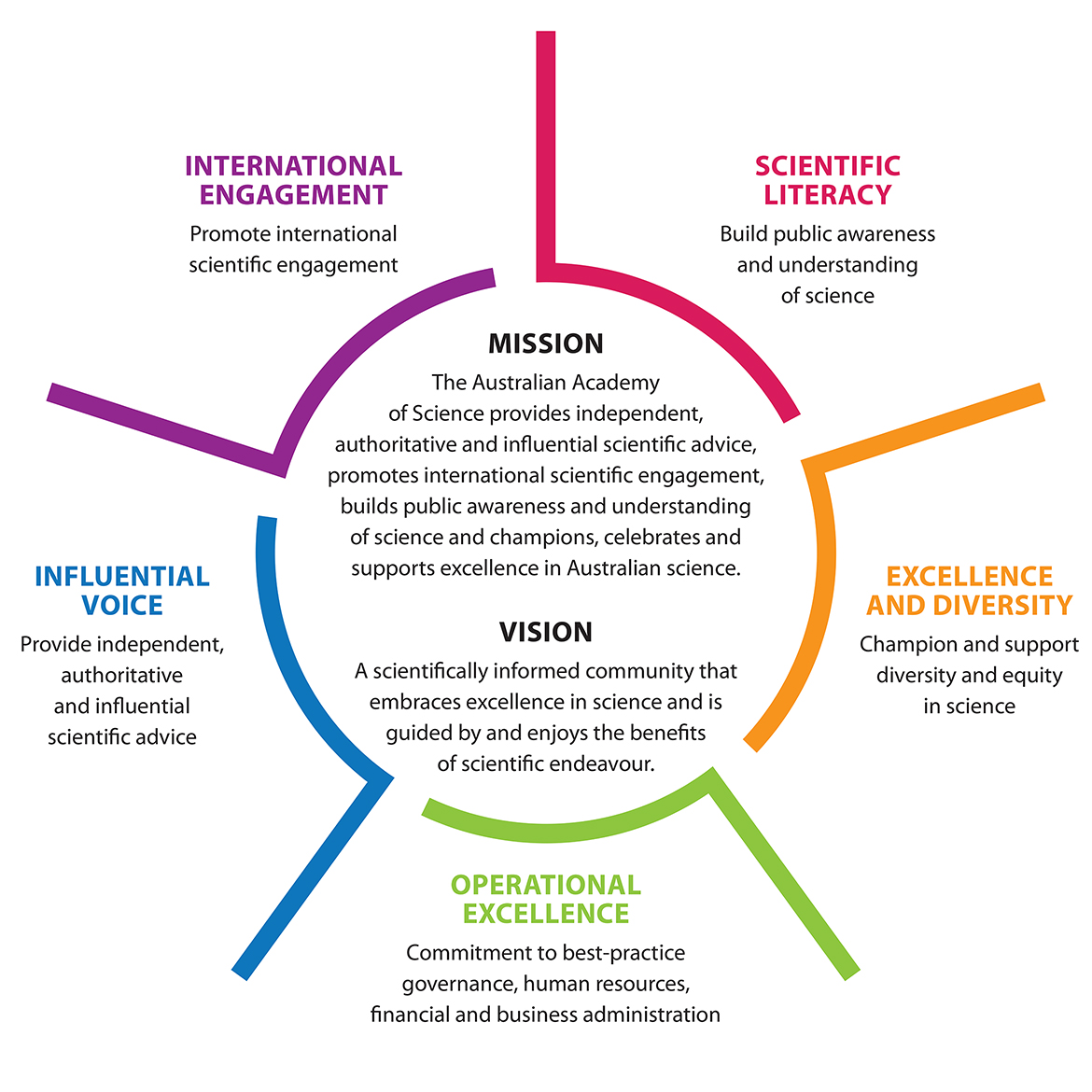

Cover of ‘Discovering Biodiversity: A decadal plan for taxonomy and biosystematics in Australia and New Zealand’. Artwork: 'Abundance' by David Stacey.
Professor Geordie Williamson was elected a Fellow of the Academy and made a Fellow of the Royal Society in 2018
Fellows at 31 December
Fellows elected in 2018
Corresponding Members admitted
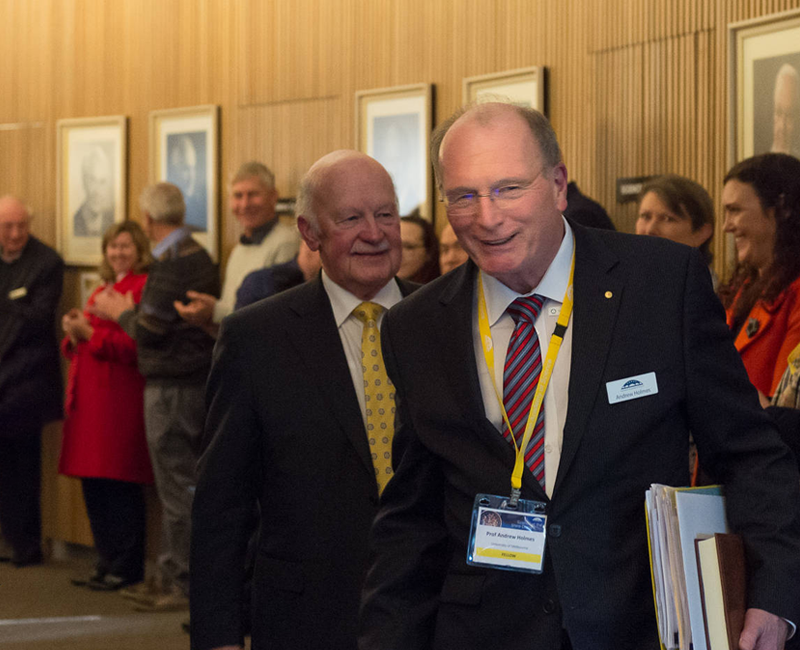
Academy employees farewelling Andrew Holmes and welcoming John Shine as President.
In May, the Academy farewelled outgoing President Professor Andrew Holmes AC FAA FRS FTSE and welcomed incoming president Professor John Shine AC PresAA.
|
Full Name |
Award: Award Short Name |
|
Professor Rose Amal AC FAA FTSE |
Order of Australia: Companion in the General Division |
|
Professor Jillian Banfield FAA FRS |
Royal Society of London, Fellow |
|
Professor Martin Banwell AO FAA |
Order of Australia: Officer in the General Division |
|
Professor Michael Barber AO FAA FTSE |
Order of Australia: Officer in the General Division |
|
Dr Robin Bedding AM FAA |
Order of Australia: Member in the General Division |
|
Professor Christine Beveridge FAA |
ARC Australian Laureate Fellowship |
|
Emeritus Professor David Blair FAA |
WA Premier's Science Awards: Hall of Fame Inductee |
|
Professor Joss Bland-Hawthorn FAA |
Visiting Miller Professorship, UC Berkeley |
|
Professor David Bowtell FAA |
NHMRC Project Grant Award |
|
Professor Geoffrey Burnstock AC FAA FRS |
Order of Australia: Companion in the General Division |
|
Professor Frank Caruso FAA FRS |
Royal Society of London, Fellow |
|
Professor David Celermajer AO FAA |
AAHMS, Fellow |
|
Professor Susan Clark FAA |
NHMRC Research Fellowship Award |
|
Professor David Cooper (dec) AC FAA |
Order of Australia: Companion in the General Division |
|
Professor Marcello Costa FAA |
FNM Lifetime Achievement Award |
|
Professor Warrick Couch FAA |
Royal Society Te Apārangi, Hon. Fellow |
|
Professor David Craik FAA |
NHMRC Project Grant Award |
|
Professor Noel Cressie FAA |
Moyal Medal, Macquarie University |
|
Professor Patrick De Deckker AM FAA |
Officer of the Order of Leopold II |
|
Professor Ron Ekers AO FAA FRS |
National Academy of Sciences (USA), Foreign Associate |
|
Professor Graham Farquhar AO FAA FRS |
Senior Australian of the Year |
|
Dr Alan Finkel AO FAA FTSE |
National Science and Technology Advisory Council, Member |
|
Professor Ian Frazer AC FAA FRS FTSE |
National Science and Technology Advisory Council, Member |
|
Professor Julian Gale FAA |
ARC Australian Laureate Fellowship |
|
Professor Jozef Gécz FAA |
NHMRC Project Grant Award |
|
Professor Jozef Gécz FAA |
NHMRC Research Fellowship Award |
|
Professor Karl Glazebrook FAA |
ARC Australian Laureate Fellowship |
|
Professor Greg Goodall FAA |
Lorne Genome Conference Julian Wells Medal |
|
Professor Martin Green AM FAA FRS FTSE |
Global Energy Prize |
|
Professor Kliti Grice FAA |
ANZAAS Medal |
|
Professor Justin Gooding FAA FTSE |
Australian Academy of Technological Sciences and Engineering Fellow |
|
Professor Justin Gooding FAA FTSE |
NHMRC Project Grant Award |
|
Professor Bob Graham AO FAA |
NHMRC Project Grant Award |
|
Professor Richard Harvey AM FAA FRS |
NSW Premier's Prize, Biological Sciences - Cell,Molecular,Medical,Vet,Genetics |
|
Professor Bill Heath FAA |
NHMRC Research Fellowship Award |
|
Professor Barbara Howlett FAA |
National Science and Technology Advisory Council, Member |
|
Professor Terry Hughes FAA |
Prince Albert II of Monaco Foundation Award for Climate Change |
|
Professor Terry Hughes FAA |
A.G. Huntsman Award |
|
Professor Terry Hughes FAA |
The John Maddox Prize |
|
Professor Chennupati Jagadish AC FAA FTSE |
UNESCO Medal, Nanosciences and Nanotechnologies |
|
Professor Chennupati Jagadish AC FAA FTSE |
Indian National Academy of Engineering, Foreign Fellow |
|
Professor Graeme Jameson AO FAA FRS FTSE |
Royal Society of London, Fellow |
|
Professor Nalini Joshi AO FAA |
Eureka Prize, UTS, Outstanding Mentor of Young Researchers |
|
Professor Anne Kelso AO FAA |
AAHMS, Fellow |
|
Professor Bostjan Kobe FAA |
ARC Australian Laureate Fellowship |
|
Professor Bostjan Kobe FAA |
NHMRC Project Grant Award |
|
Dr Anna Koltunow FAA FTSE |
Australian Academy of Technological Sciences and Engineering Fellow |
|
Professor Sharad Kumar AM FAA |
Order of Australia: Member in the General Division |
|
Professor Sharad Kumar AM FAA |
NHMRC Project Grant Award |
|
Professor Kurt Lambeck AO FAA FRS |
Prime Minister's Prize for Science |
|
Professor Geoffrey Lindeman FAA |
NHMRC Centres of Research Excellence Award |
|
Professor Melissa Little FAA |
NHMRC Elizabeth Blackburn Fellowship Award (Biomedical) |
|
Professor Melissa Little FAA |
HMRC Research Fellowship Award |
|
Professor Melissa Little FAA |
NHMRC Project Grant Award |
|
Professor Lew Mander AC FAA FRS |
Order of Australia: Companion in the General Division |
|
Professor Jennifer Martin AC FAA |
Order of Australia: Companion in the General Division |
|
Professor Thomas Maschmeyer FAA FTSE |
Eureka Prize, CSIRO, Leadership in Innovation and Science |
|
Professor Alex McBratney FAA |
NSW Premier's Prize, Exl in Biological Sciences (Eco, Env, Ag & Org) |
|
Professor James McCluskey AO FAA |
Order of Australia: Officer in the General Division |
|
Professor Trevor McDougall AC FAA FRS |
Order of Australia: Companion in the General Division |
|
Professor Geoff McFadden FAA |
NHMRC Project Grant Award |
|
Professor Patrick McGorry AO FAA |
NHMRC Research Fellowship Award |
|
Professor Ross McPhedran FAA |
Rolf Landauer Medal |
|
Professor Jacques Miller AC FAA FRS |
Japan Prize |
|
Professor John Miners FAA |
AAHMS, Fellow |
|
Professor Dietmar Müller FAA |
NSW Premier's Prize: Excl in Maths, Earth Sc, Chem and Physics |
|
Professor Stephen Nutt FAA |
NHMRC Project Grant Award |
|
Professor Stephen Nutt FAA |
NHMRC Project Grant Award |
|
Professor Stephen Nutt FAA |
NHMRC Research Fellowship Award |
|
Professor Rob Parton FAA |
NHMRC Research Fellowship Award |
|
Professor Linda Richards FAA |
NHMRC Project Grant Award |
|
Dr Ezio Rizzardo AC FAA FRS FTSE |
Order of Australia: Companion in the General Division |
|
Professor Halina Rubinsztein-Dunlop AO FAA |
Order of Australia: Officer in the General Division |
|
Professor Halina Rubinsztein-Dunlop AO FAA |
Eureka Prize, UNSW, Excellence in Interdisciplinary Scientific Research |
|
Professor Louise Ryan FAA |
Pitman Medal Statistical Society of Australia |
|
Professor Ingrid Scheffer AO FAA FRS |
Royal Society of London, Fellow |
|
Professor Brian Schmidt AC FAA FRS Nobel Laureate |
National Science and Technology Advisory Council, Member |
|
Professor Michelle Simmons FAA FRS FTSE |
Australian of the Year |
|
Professor Michelle Simmons FAA FRS FTSE |
Royal Society of London, Fellow |
|
Professor Scott Sloan AO FAA FRS FTSE |
Order of Australia: Officer in the General Division |
|
Professor Sever Sternhell AO FAA |
Order of Australia: Officer in the General Division |
|
Professor Bruce Stillman AO FAA FRS |
Honorary Doctor of Science, Clarkson University |
|
Professor San Thang AC FAA FTSE |
Order of Australia: Companion in the General Division |
|
Dr Hugh Tyndale-Biscoe AM FAA |
Order of Australia: Member in the General Division |
|
Professor Peter Visscher FAA FRS |
Royal Society of London, Fellow |
|
Professor Peter Visscher FAA FRS |
ARC Australian Laureate Fellowship |
|
Professor Branka Vucetic FAA FTSE |
NSW Premier's Prize, Excellence in Engineering and ICT |
|
Dr Brian Walker FAA FTSE |
Blue Planet Prize |
|
Professor Geordie Williamson FAA FRS |
Royal Society of London, Fellow |
|
Professor Geordie Williamson FAA FRS |
Australian Mathematical Society Medal |
|
Professor Geordie Williamson FAA FRS |
National Science and Technology Advisory Council, Member |
Academy-related activities in which Fellows were involved included • National Committees • international meetings and collaborations • awards committees • Academy policy submissions and reports • sectional committees for assessing nominations of new Fellows • media participation • video and article reviewers • symposium convenors • Science at the Shine Dome • National Speaker Series • Canberra Speaker Series • regional groups • 18 Champions of Diversity appointed to suggest diversity candidates for Fellowship and the Academy awards
Professor Jane Elith was awarded the 2016 Fenner Medal and elected a Fellow of the Academy in 2017
total value of awards
awardees

2018 honorific awardees.
Professor Douglas MacFarlane FAA FTSE
Professor David Cooke
Professor Matt King
Professor Calum John Drummond FTSE
Professor Geoffrey Burnstock FAA FRS
Professor Anushka Patel
Professor Killugudi Swaminathan Iyer
Dr Marie-Liesse Asselin-Labat
Associate Professor Shanyong Wang
Dr Ceridwen Fraser
Dr Irina Voineagu
Associate Professor Alex Fornito
Dr Rhodri Davies
Dr Zdravko Botev
Associate Professor Tracy Ainsworth
Dr Paul Lasky
Dr Alex Sen Gupta
Associate Professor Amir Karton
The 2018 awards were announced in November 2017 and most were presented at the Academy’s annual flagship event, Science at the Shine Dome, in May 2018. The Ian Wark medal was presented at an award dinner in Melbourne in July 2018 and the and Haddon Forrester King Medal was presented at an award dinner in September 2018.
career research awards awarded
mid-career research awards awarded
early-career research awards awarded
worth of associated honorariums and lecture funding

(from left) Ms Melissa Houghton and Mrs Charlie Phelps were each awarded a Max Day Environmental Science Fellowship Award in 2018.
Dr Lara Malins
The Australian National University—to develop a new synthetic approach to valuable amino acid derivatives and their rapid incorporation into peptide analogues, including promising new antibiotic candidates.
Dr Tara Clark
The University of Queensland—to determine the timing and associated drivers behind dramatic changes in coral communities on reef flat environments since European settlement.
Dr Jussi Lehtonen
The University of Sydney—to reconcile and unify alternative methods in social evolution theory.
Dr Nengkun Yu
University of Technology Sydney—to develop fundamental technology for analysing the big data that arises from quantum physics.
Dr Shamil Cooray
Co-designed a patient-centred model-of-care for gestational diabetes.
Ms Lisa Hunt
The University of Adelaide—The development of Australian science during a period of significant change (1945 to 1963), and its impact on popular perceptions of science in Australia.
Dr Grace Muriuki
University of Queensland—Food security in rural and remote indigenous communities of The Pilbara; potential for resource corridors in local food systems.
Dr Tim Doherty
Deakin University—Ecological consequences of introduced predator removal for a native mesopredator and ecosystem engineer Varanus gouldii
Ms Nicole Foster
University of Adelaide—Prioritising for success: Innovative approaches to management of coastal environments
Dr Joel Daniel Haywood
University of Western Australia—Structure-based investigations into plant growth pathway proteins.
Dr Sambasivam Periyannan
Australian National University—Protecting Australia’s Eucalypt landscape from myrtle rust invasion by rapid identification of natural resistance.
Dr Adriana Vergés
University of New South Wales Sydney—What are the food web implications of temperate reefs becoming increasingly dominated by tropical species?
Associate Professor Tracy Ainsworth
University of New South Wales Sydney—The impact of a changing climate to New South Wales coral populations.
Dr Staffan Persson
University of Melbourne—Monitoring fungal root wilt disease on canola in real-time.
Associate Professor Heloise Gibb
La Trobe University—Can we restore soil microbial communities by reintroducing digging mammals?
Dr Cindy Gunawan
University of Technology Sydney—Does the commercialised use of antimicrobial silver nanoparticles facilitate co-selection and spread of antibiotic resistance genes in marine microbiota? A metagenome study.
Ms Rebecca Jane Webb
James Cook University—A novel conservation tool for controlling chytridiomycosis in Australian amphibians.
Dr Teigan Cremona
Charles Darwin University—Can predator enclosures support recovery of small mammal populations in Kakadu National Park?
Ms Heather Neilly
Australian Landscape Trust—Malleefowl as ecosystem engineers and drivers of restoration.
total committed in 2018
awardees
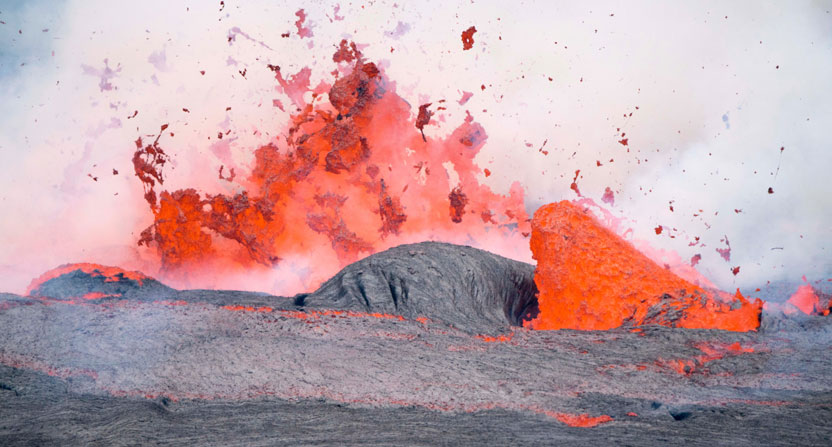
The 2018 Elizabeth and Frederick White Conference encompassed diverse topics—from astrophysics to volcanoes.
Evolutionary transformations in vertebrate history (2019–20)
Managing wild and weedy Australia across boundaries and disciplines (2019–20).
Linking galaxies from the epoch of initial star formation to today (2019–20)
total committed in 2018
joint organisers
attendees at 4 conferences held in 2018 at two venues in the ACT
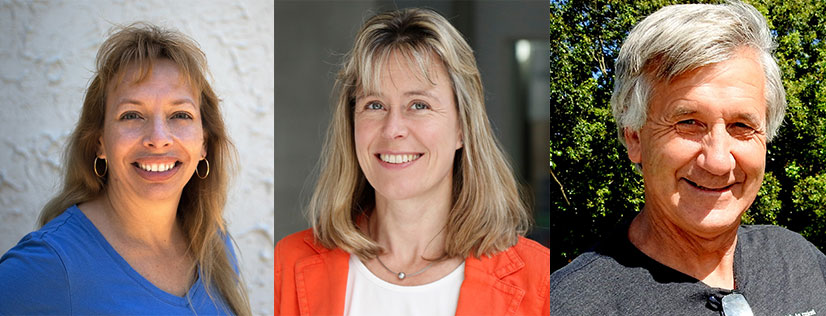
(from left) In 2018, Dr Christina Kellogg, Selby Fellowship, Professor Stefanie Dimmeler, Rudi Lemberg Travelling Fellowship, and Dr Graham Nugent, Graeme Caughley Fellowship benefited from the Academy’s travelling fellowships that foster the international exchange of scientific ideas and support lectures for the general public.
University of Technology Sydney—To visit the Alan Turing Institute in London to study computational methods that have applications in public health and education.
Baker IDI Heart and Diabetes Institute—To attend the Science at the Shine Dome Event in 2019, the annual signature event of the Australian Academy of Science.
University of Canberra—To visit New Zealand to learn how Maori culture has incorporated Indigenous knowledge and values into their water management practice.
Professor of Theoretical Geophysics Emeritus, University of Cambridge—to present lectures in Perth, Adelaide, Sydney, Melbourne, Brisbane, Darwin and Alice Springs.
Department of Physics and Astronomy, University of Waterloo Canada—to present the 2019 Frew Fellowship lecture at the CLEO Pacific Rim Conference in August 2020; will also visit institutes and presenting lectures at a number of venues in Australia.
total committed
lectures held
universities and organisations
estimated attendees across Australia and internationally. 10 lectures were held in Canada, Spain, Mexico and the USA.
Professor Veena Sahajwalla was elected a Fellow of the Academy in 2018
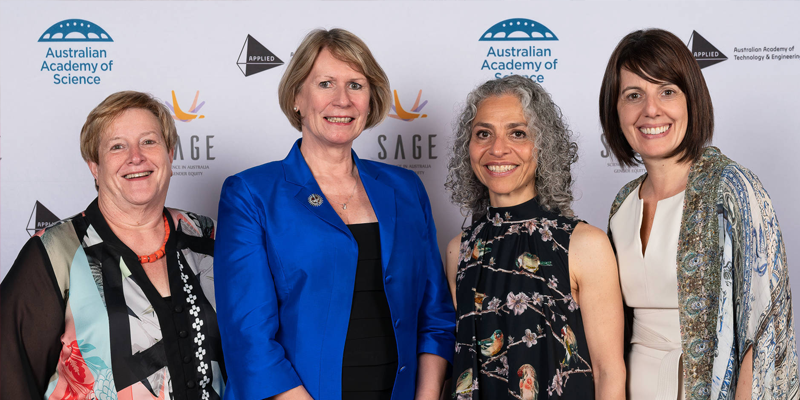
(from left) Margaret Hartley, Chief Executive Officer Applied, Alison Johns, Chief Executive Advance Higher Education UK, Wafa El-Adhami, Executive Director SAGE, and Anna-Maria Arabia, Chief Executive Australian Academy of Science at the SAGE Awards.
15 organisations were presented with the first SAGE Athena SWAN Bronze Awards for improving gender equity and diversity.
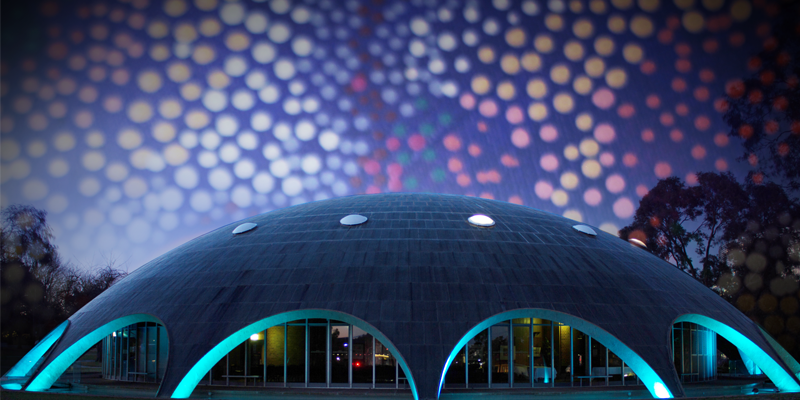
The Academy launched the Aboriginal and Torres Strait Islander Scientist Travelling Research Award to recognise research in the natural sciences by outstanding Aboriginal and Torres Strait Islander PhD students and early- and mid-career scientists.The award aims to support the expansion and growth of each scientist’s research networks and international knowledge exchange through visits to relevant international centres of research.
The three inaugural recipients of the 2019 award, Bradley Moggridge, Tui Nolan and Amy Searle, were announced at the end of 2018. These recipients will be featured in the 2019 annual report.
The Academy was requested do develop a Women in STEM decadal plan in collaboration with the Australian Academy of Technology and Engineering. The plan provides a 10-year roadmap for achieving sustained increases in women’s STEM participation and retention from school through to careers.
The Academy commenced a decadal plan and online website to support and promote women in STEM. We:
The Academy:
Key diversity and inclusion initiatives of the Academy and areas of focus
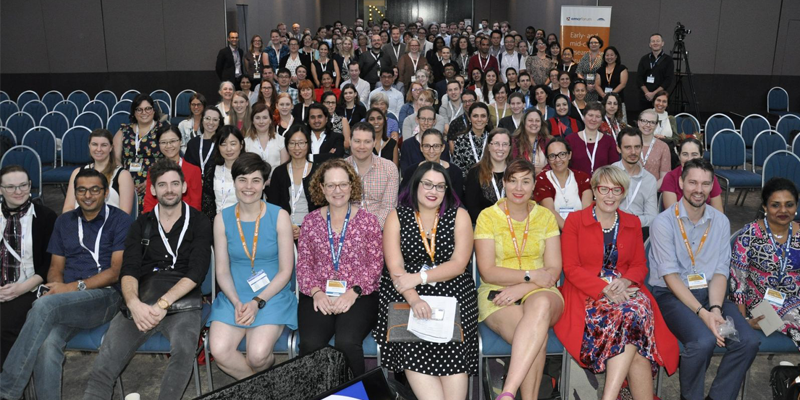
Science Pathways.
The Academy supported thousands of early- and mid-career researchers (EMCRs). We:
researchers were members of the EMCR Forum
researchers were members of the Australian Brain Alliance EMCR Brain Science Network
EMCRs participated in 11 events designed to improve scientific and personal skills and professional networks
policy submissions were made by the EMCR Forum to ensure voices of EMCRs were heard
EXPLANATION HERE
The Academy:
parliamentarians met with Academy representatives
submissions were made to government enquiries and reviews
Image: NASA
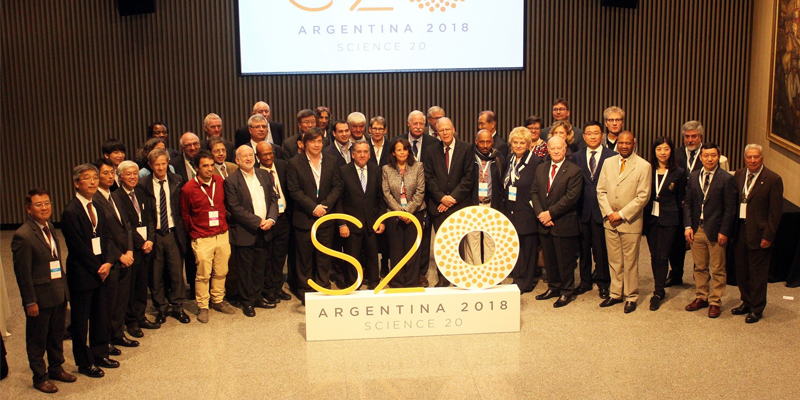
S20 Argentina 2018.
The Academy recommended Associate Professor Madhu Bhaskaran, from RMIT University, to the Department of Industry, Innovation and Science to be the Australian nominee for the 2018 APEC Science Prize for Innovation, Research and Education (ASPIRE). Associate Professor Bhaskaran’s nomination was successful and she was awarded the ASPIRE Prize at the tenth APEC PPSTI meeting in Papua New Guinea in August, making her the first Australian to receive the prestigious award since 2011.
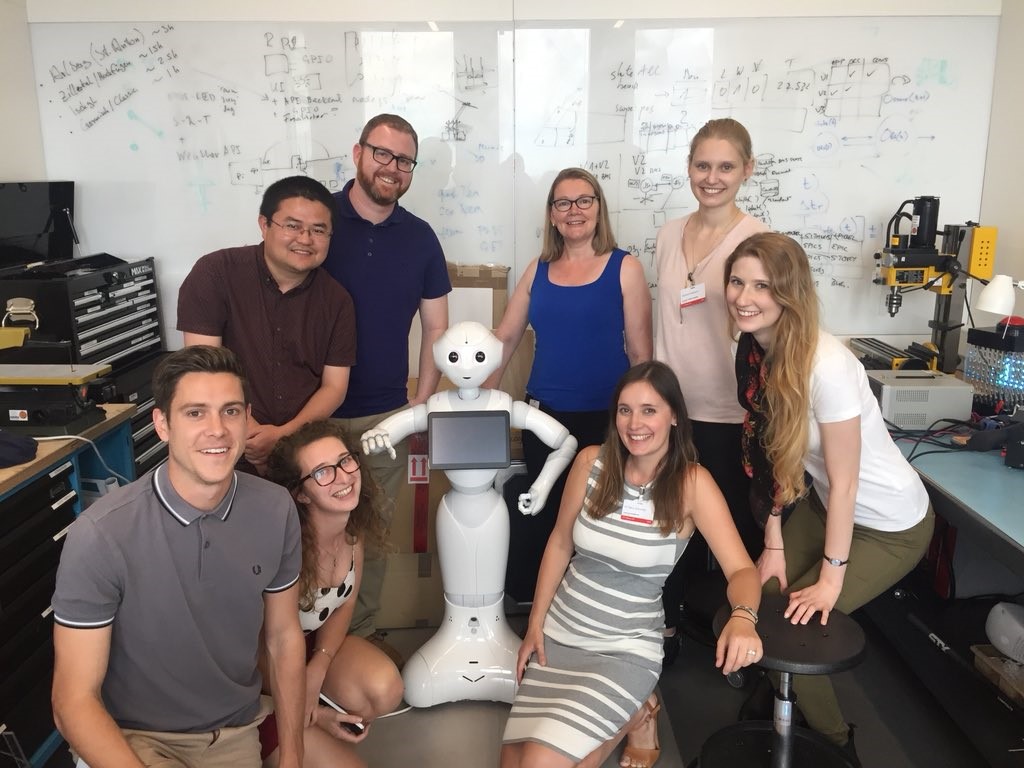
The Australian delegation to Lindau with delegation leader and Academy Fellow Professor Jenny Martin (centre back) at IBM Watson in Munich.
Eight top young Australian scientists were supported by the Science and Industry Endowment Fund and the Academy to attend the 68th Lindau Nobel Laureate Meeting in Germany. The delegation was led by Academy Fellow Professor Jennifer Martin. A total of 600 young scientists from 84 nations had the opportunity to interact with, and learn from, 39 Nobel Laureates.
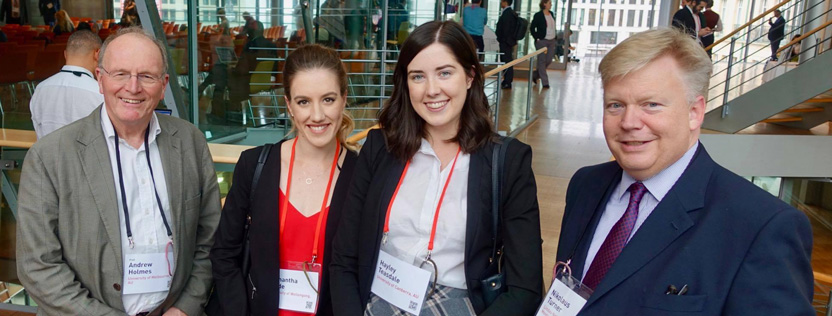
At Falling Walls in Berlin were (from left) Academy Fellow Professor Andrew Holmes, Australian representatives Ms Samantha Wade and Ms Hayley Teasdale, and Mr Nikolaus Turner, Managing Director and Member of the Executive Board of the Foundation Lindau Nobel Laureate Meetings. Photo: Hans Bachor.
The Academy hosted the third annual Falling Walls Lab Australia in September. 20 researchers from across Australia presented their three-minute talk to a panel of distinguished jury members, chaired by Australia’s Chief Scientist Dr Alan Finkel. The first and second place winners, Samantha Wade from the University of Wollongong and Hayley Teasdale from the University of Canberra, earned the opportunity to compete at the Falling Walls Lab Finale in Berlin. The Australian delegation included Academy Fellows Professor Veena Sahajwalla and Professor Terry Hughes, who spoke at the event.
The research that the other contestants presented was amazing, with solutions to problems I had never even thought about before. Overall, for someone who has had very little experience in these kinds of competitions, it was one of the best things I’ve done in my research career and I can’t recommend it highly enough.
Samantha Wade—University of Wollongong. Falling Walls Lab Australia 2018 winner, and presenter at Falling Walls Lab Finale, Berlin.
international science meetings attended by Academy representatives
international events and collaboration opportunities supported by the Academy
researchers were supported to participate in the Academy’s international activities in Australia
researchers were supported to participate in the Academy’s activities overseas.
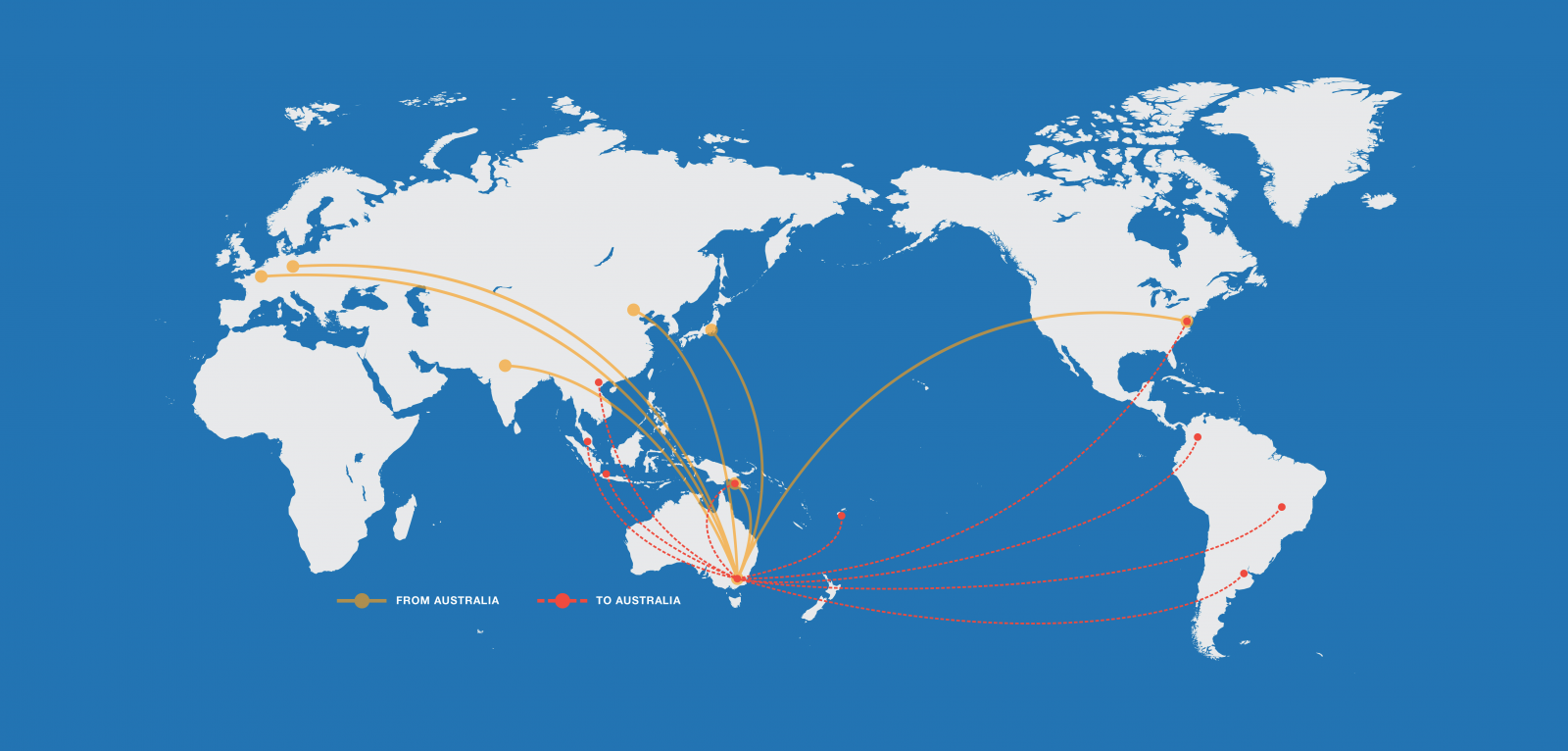
The Academy supported 75 Australian researchers to travel internationally, and 46 overseas reasearchers to travel to Australia, with the goal of increasing collaboration and building networks between scientists.
|
Activity |
No. of researchers supported in Australia |
No. of researchers supported overseas |
|
APEC Science Prize for Innovation, Research and Education (ASPIRE) – Papua New Guinea |
3 |
1 |
|
Visit to the National Institutes of Health in the USA by a Junior Scientist, including support from the Adam J Berry Memorial fund |
1 |
|
|
France-Australia Science Innovation Collaboration (FASIC) Fellowships |
4 |
|
|
Science at the Shine Dome |
4 EMCRs – 1 each from Malaysia, Indonesia, Fiji and Vietnam |
|
|
Australia-China Joint Workshop on Measurement Solutions for Electrical Networks |
8 |
|
|
14th China-Australia Symposium: Light changes our life |
14 (includes 5 Australian EMCRs) |
|
|
Research Data Science Winter School |
2 EMCRs – 1 from Indonesia and 1 from PNG |
|
|
2018 Australia-Americas PhD Research Internship Program |
40 EMCRs – 21 from USA, 10 from Brazil, 4 from Argentina, 5 from Colombia |
|
|
10th HOPE Meeting with Nobel Laureates in Japan |
6 |
|
|
Japan Society for the Promotion of Science fellowships |
13 |
|
|
Australia–India Strategic Research Fund (AISRF) Early- and Mid-Career Fellowships |
14 |
|
|
Falling Walls Lab Australia |
22 |
|
|
Falling Walls Lab Berlin |
4 |
|
|
European Cooperation in Science and Technology (COST) France |
1 |
|
|
SIEF-AAS Fellowships to the Lindau Nobel Laureate Meetings |
8 |
|
|
SIEF-AAS Heidelberg Laureate Forum Fellowship |
1 |
The Hope meeting with Nobel Laureates provided me with an excellent opportunity to present my research and hear about ground-breaking research from around the world in a friendly environment that encouraged creative and critical thinking.
Dr James Aridas, Monash University–10th HOPE Meeting with Nobel Laureates Participant
This is an excellent scheme considering the potential of research and economic collaboration opportunities between Australia and India. India has a growing industry looking for advanced technology which is an excellent opportunity for collaboration for Australian research institutes. The fellowship also fosters opportunities to engage research students through joint projects and exchange studies.
Dr Rangam Rajkhowa, Deakin University–Australia–India Strategic Research Fund (AISRF) Early- and Mid-Career Fellowships Recipient
This international collaboration was fundamental to add scientific quality to my research. From the links established, our work will have a global collaboration and will be characterised as a multicentre study adding even more value to the scientific evidence produced from this research.
Gisele Jung Franciscatto, Pontifical Catholic University of Rio Grande do Sul, Porto Alegre (PUCRS), Brazil–hosted by the University of Adelaide under the 2018 Australia–Americas PhD Research Internship Program
This meeting has opened my mind about how to be a great scientist and I committed to be a great and professional scientists since then. I am really impressed with all participants, fellows and awardees. It would be great opportunity if I could collaborate with the early- and mid-career researchers someday in the future. I found that Australian scientists are very nice, open and welcome to any possible cooperation, which is completely different with my thought before joining the event.
Dr Heri Kuswanto, Center for Earth, Disaster and Climate Change & Department of Statistics Institut Teknologi Sepuluh Nopember (ITS) Indonesia–attending 2018 Science at the Shine Dome
The Academy's National Committees for Science:
|
National Committee |
Outgoing Chair |
Incoming Chair |
|
Astronomy |
Professor Lisa Kewley FAA |
Professor Lister Staveley-Smith |
The following Australian organisations partnered with the Academy and contributed towards Australia’s annual subscriptions to international unions of the International Science Council:
National Committees for Science, involving 250 volunteer members
of National Committee members were woman
Three new Primary Connections curriculum units were published
Never has there been a more important time for science in Australia. More than ever, we need a scientifically-literate community to engage in debates about issues that affect us all. We also need imaginative thinkers to discover the opportunities in our exponentially expanding knowledge base. Teachers play a vital role in nurturing the minds of our future citizens and scientists.
Australian Academy of Science President, Professor John Shine [Primary Connections Foreword, 2018]
Our widely used programs, Primary Connections: linking science with literacy, Science by Doing and reSolve: Mathematics by Inquiry, supported and gave confidence to teachers and students throughout Australia and internationally.
Three new Primary Connections curriculum units were published and available free-of-charge in the Education Services Australia’s repository, Scootle, during National Science Week. Primary Connections launched e-resource sheets, which were shown to reduce teachers’ planning time and make it easier to differentiate lessons while also being easy for students to use and increase their engagement.
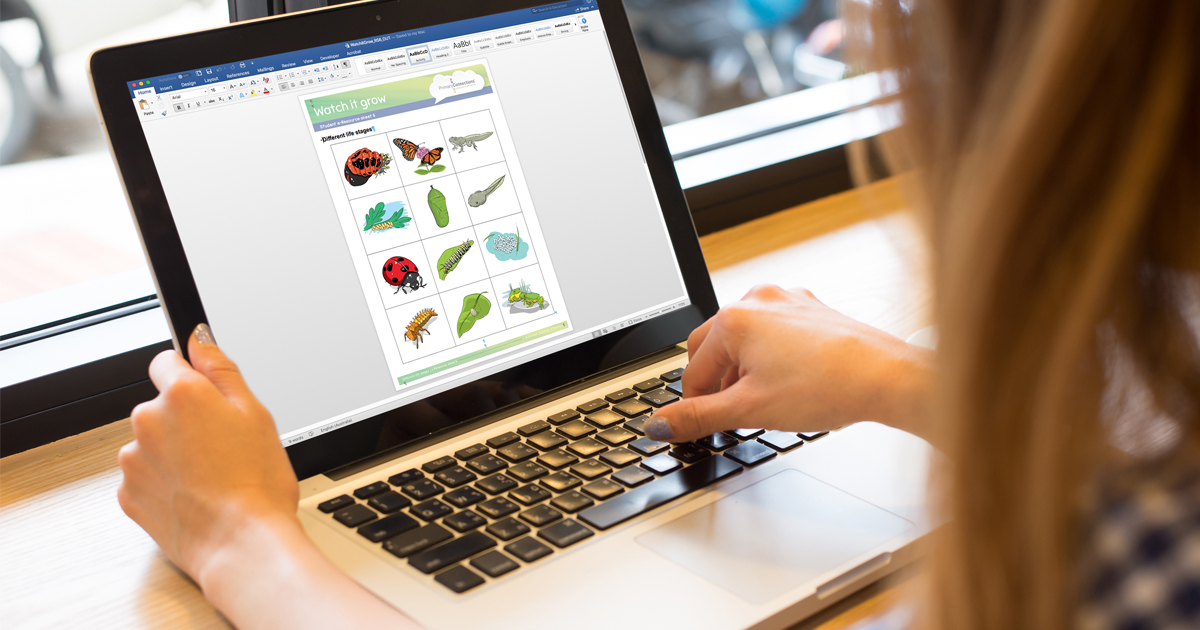
The reSolve Champions are volunteers who have a commitment to better mathematics outcomes for their students, and to working with colleagues in and beyond their school in mathematics. A national showcase celebrated the commitment and investment of the project’s Champions network.
The number of reSolve resource downloads increased from an average 3000 a month in 2017 to an average 11,000 a month in the third quarter of 2018.
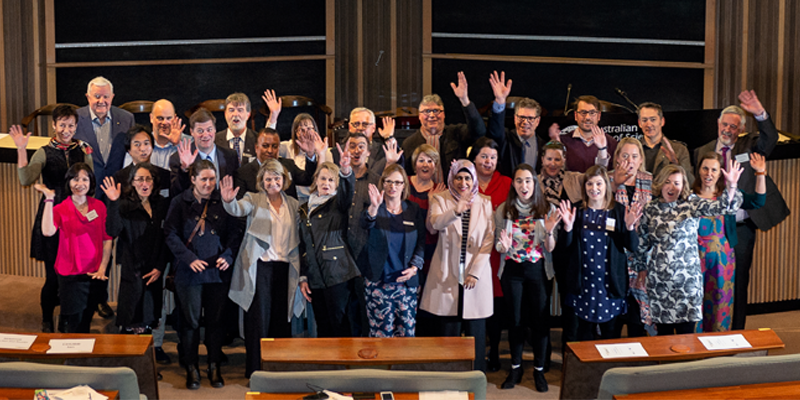
reSolve Champions celebrating the program's impact at a national showcase event at the Academy.
Science by Doing continued its rise is popularity, consistent with previous years.
Number of Science by Doing program registrations (cumulative)
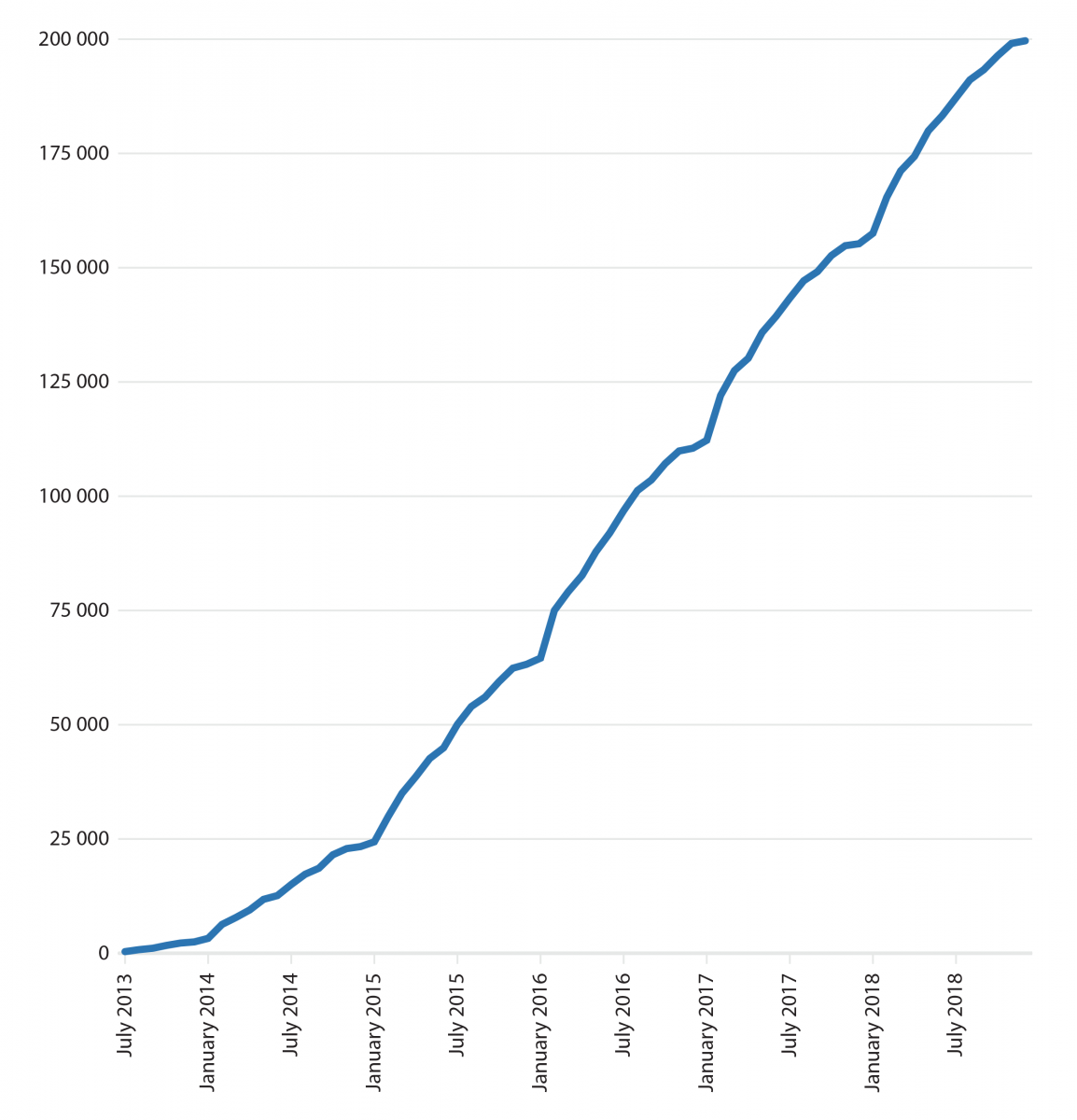
External evaluations of the Academy’s education programs showed significantly positive outcomes for teaching and highlighted their ongoing contribution to Australian education.
The findings in the University of Technology Sydney research and evaluation report of Stage 6 of Primary Connections are positive and provide evidence of the significant impact of Primary Connections on the teaching and learning of science and literacy in Australian primary schools.
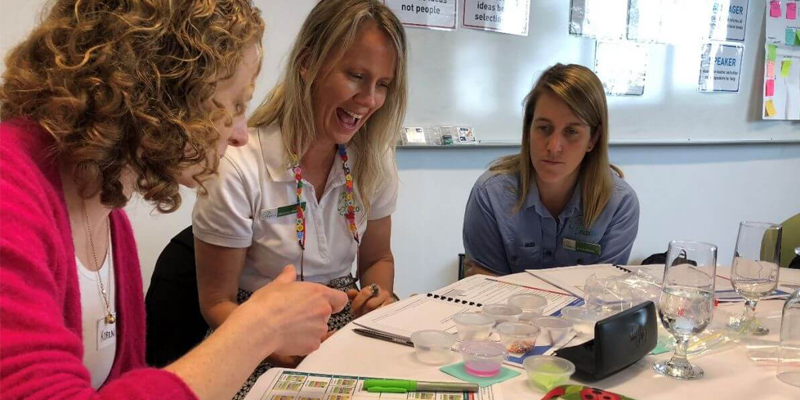
Teachers at a Primary Connections workshop.
Preliminary findings by dandalopartners, which is undertaking an external evaluations of reSolve, suggest that reSolve is making:
high quality resources: reSolve resources are high quality and comparable to other mathematics education resources
an impact on teachers: reSolve resources appear to be having a positive impact on teachers’ knowledge, attitudes and actions
an impact on students: While it is too early to measure impact on students, anecdotal evidence suggests that students are engaged with the resources, with some promising signs related to achievement.
According to the evidence gathered from teachers and students in the University of Technology Sydney evaluation of Stage 4 of Science by Doing, the program has had a very positive impact on teaching and learning. Students said they enjoyed learning science using the Science by Doing resources.
I’m really pleased that the resource is being constantly updated and made relevant. My only worry is that we have implemented the SbD resource and so will always be concerned if it gets cancelled or stopped. It is a tremendous resource and the enotebook has now become a significant part of our program. Navigation on the updated units are great—thank you.
Science teacher
A key strength of Academy education programs are collaborations and partnerships with state and territory governments, science and maths teacher associations and other peak bodies, and university education faculties.
The Australian Government, through the National Innovation and Science Agenda, committed additional funding of $3 million for the Academy’s three education programs to 2020.
The Academy reached 1.2 million Facebook followers
The Academy aims to fill that need by providing accurate and engaging content for everyone. With a team of scientists, science communicators and journalists, we publish current, interesting and understandable information covering the breadth of science.
The Academy reached 1 million Facebook followers in October, and 1.2 million by the end of December. Our posts reached over 42 million people.
The Academy’s video production capability achieved rapid growth in both the quantity of videos created and number of people reached. The majority explored science, some were designed for specific events like the SAGE Awards, International Brain Initiative or Science at the Shine Dome, and others were public education campaigns covering topics like immunisation and meningococcal disease. Our articles added depth to many of the videos produced and gained a significant audience of their own.
The success of the video production capability attracted interest across the media and marketing industry. Presentations were given at the industry-leading Mumbrella 360, World Congress of Science and Factual Producers, and Public Communication of Science and Technology events. The team was also recognised by the Public Relations Institute of Australia, receiving the Golden Target Award for Not-For-Profit In-House PR Team of the Year.

Fellows were crucial to the success of the Academy’s video production capability. Fellows also provided suggestions of science stories or papers to be covered by video, and a group of the Academy’s Fellows oversaw the project.
videos produced
articles published
Fellows featured in or reviewed a video
The first genetically edited babies has caused global controversy
How we measure things like the kilogram is changing
Australia has launched a new space agency
'The extinction of much of the natural world is on the horizon'
Professor Nalini Joshi has spent her life breaking down barriers
We need to build disaster resilient communities and take action
Our immunisation campaign included six videos and five articles to answer the most common questions, including what is immunisation, what’s in a vaccine, who benefits from vaccination, how safe are vaccines and the future of vaccination. Total social media views of the videos were 4.2 million, and shares nearly 3500.
This video, produced on behalf of 22 national academies and societies of science, called for Commonwealth leaders to take action to address climate change. The video was released along with a consensus statement among the science academies. It had more than 1.1 million views on social media.
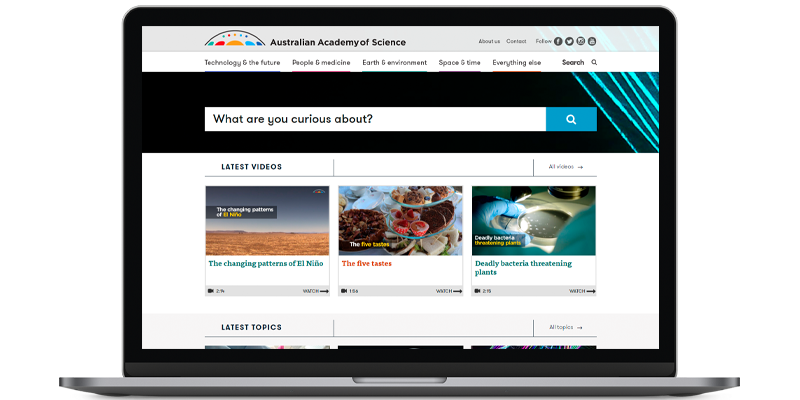

The Curious website, where we publish our science articles and videos for a broad audience, received 961,000 visits, nearly tripling the number from the previous year.
The Academy maintained a high media profile throughout the year, with Fellows and National Committee members contributing to mainstream media stories. We also produced many breaking news videos that were embedded by media outlets in online stories.
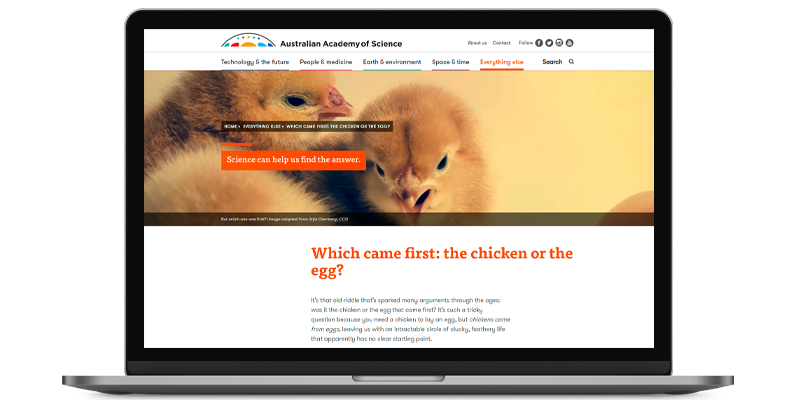
media releases issued
news articles published on our website
mentions of the Academy on social media
pieces of media coverage across radio/TV, print and online
embeds of videos into online media stories, including syndications
embeds of videos into all websites, including syndications
The Academy delivered multiple engaging events across Australia, with a highlight being more than 3000 people enjoying Dr Karl and Professor Veena Sahajwalla in during National Science Week.
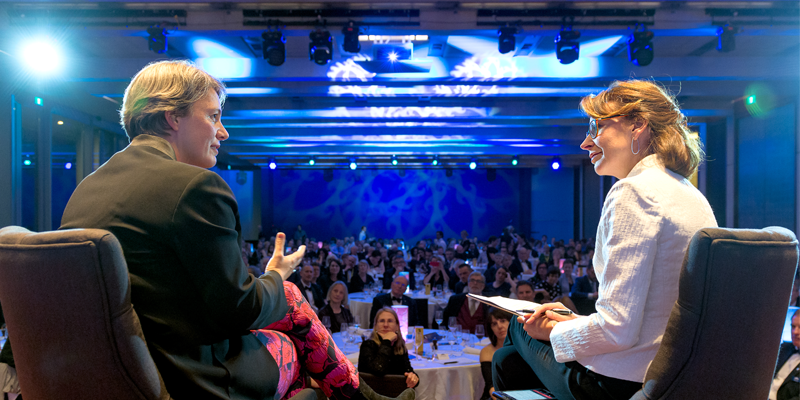
Adjunct Professor Virginia Haussegger (right) in discussion with Australian of the Year Professor Michelle Simmons at the gala dinner.
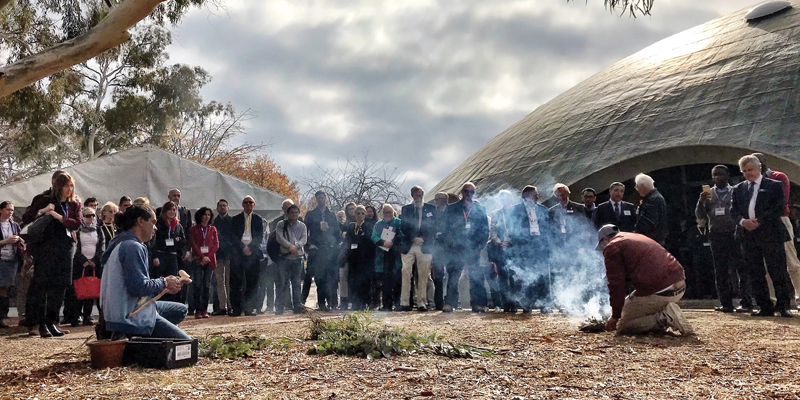
A smoking ceremony was an integral part of the event.
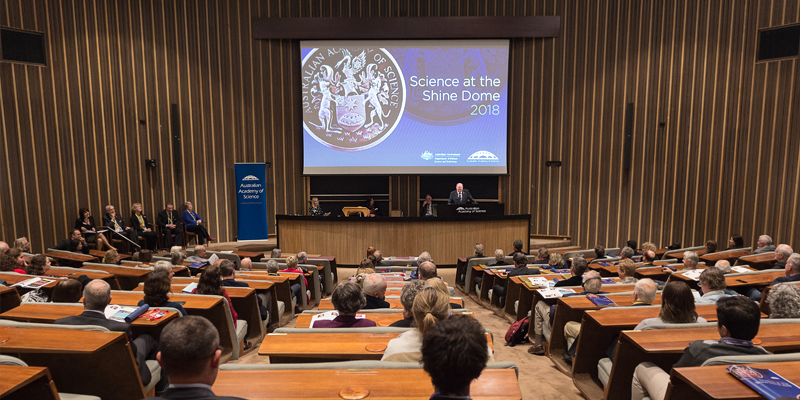
Science at the Shine Dome was a celebration of great achievements and sharing of knowledge.
Science at the Shine Dome, The Academy’s celebration of science held in May each year, saw 400 attendees hear from 57 speakers over three days.
The event started with the Academy’s annual symposium, which looked at the role of science in predicting, mitigating, responding to and recovering from natural hazards and weather events. The event also saw 21 new Fellows admitted to the Academy in recognition of their work in science.
Australian of the Year, Professor Michelle Simmons spoke at the gala dinner about her science career so far and the quest to build a quantum computer. The dinner also saw the launch of the Academy’s Aboriginal and Torres Strait Islander Scientist Travelling Research Award.
On the final day of the event, 15 researchers received highly sought-after honours for outstanding achievements in science.
new Fellows admitted
Academy medals presented
EMCR workshops
total attendees
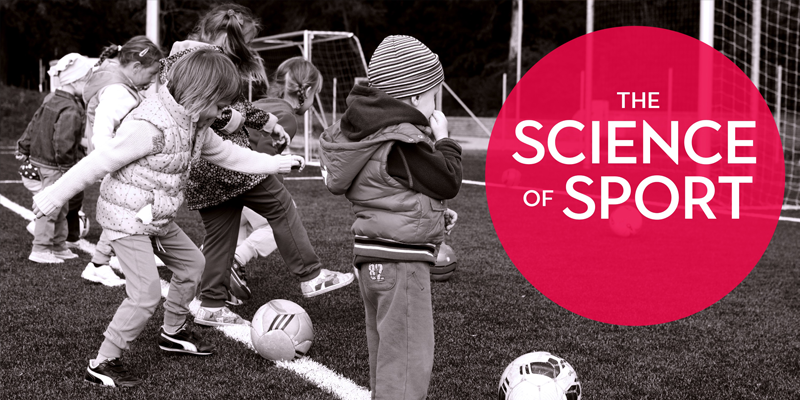
The series answered some key questions about sport and physical activity, such as Does the soccer World Cup get people off the couch? How can we efficiently fuel our bodies during physical activity? How do you motivate the physically inactive? How does exercise impact our mental health? It also explored a day in the life of an elite athlete and scientist, what research says about female participation in sport, and even how science and maths play a role in football.
total audience
total speakers
reached on Facebook
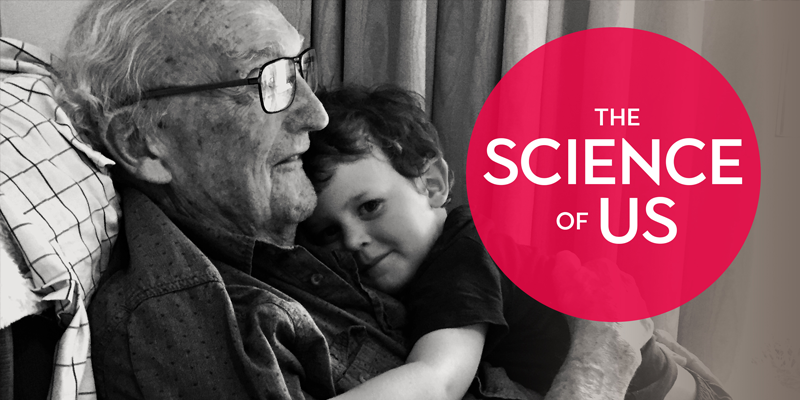
The series investigated the science of our lives and our health, from the moment of conception through to death, focusing on some of the issues we face during our lives and what science is doing to resolve them. Topics covered included reproduction, mental health, addiction, ageing of the body and brain, organ donation and palliative care.
total speakers
total audience
reached on Facebook
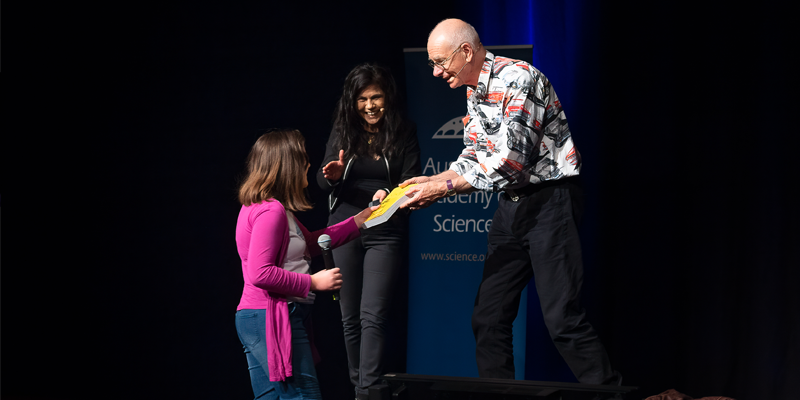
This two-part event was a resounding success, with over 1500 school students at the first show and over 1600 members of the public in the evening. Dr Karl Kruszelnicki and Professor Veena Sahajwalla informed and entertained, answered audience questions, and engaged with guests after each show. These events enabled us to continue to build public awareness and understanding of science with two of Australia’s most widely recognised science personalities.
total audience
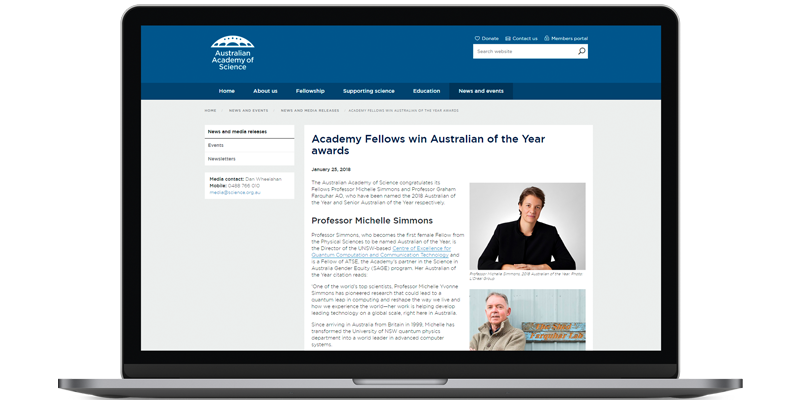
The Academy website received 673,000 visits, an increase of 27% on the previous year.
articles on the history of science
biographical memoirs
book reviews
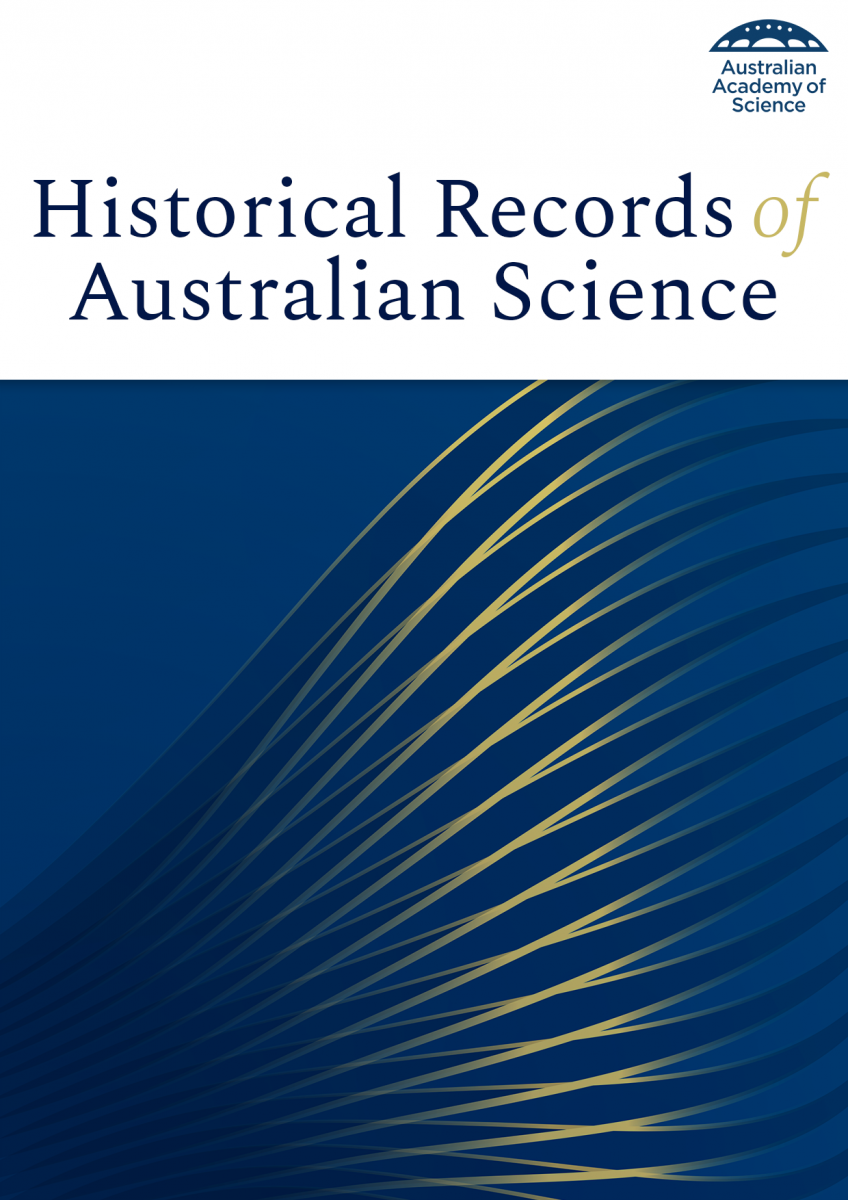
peer reviewed scientific journals from CSIRO Publishing, supported by the Academy
The development of the biodiversity decadal plan was supported by the Ian Potter Foundation. Image from the plan by Gary Cranitch / © Queensland Museum
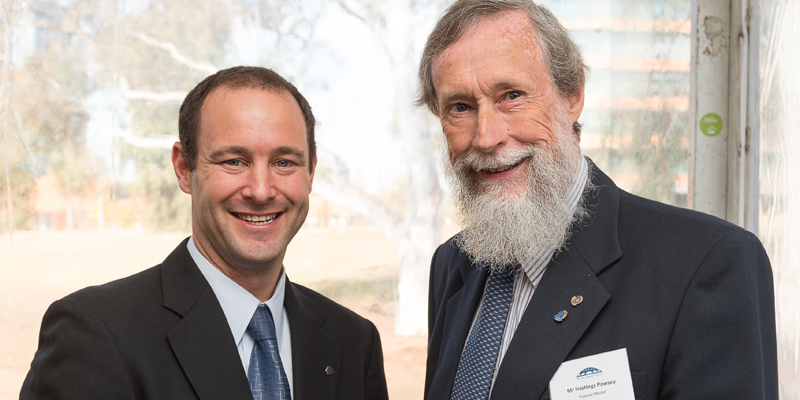
Dr Paul Lasky, recipient of the 2018 Pawsey Medal, meeting Mr Hastings Pawsey, son of Dr JL Pawsey FAA after whom the medal is named.
Many of the Academy’s core activities, such as scientific meetings, advice to support policy development, publications, education, public awareness and outreach, international activities, awards and fellowships would not be possible without philanthropic donations.
In 2018, more than $1.7 million in philanthropic donations were made to the Academy, including a generous bequest. This funding strengthens our organisation and ensures that as an independent science leader we are able to influence the future of science in Australia.
For the period 1 July 2017 – 30 June 2018:
Academy Pillars: Donations of or valued at $500,000+
Professor GW Kenneth Cavill Bequest ($1,456,000), received March 2018
President’s Circle: Donations of or valued at $100,000 – $499,000
Dorothy Hill contribution from the University of Queensland (Principal Partner) ($120,000), received December 2017
Estate of the Late Professor John Newton FAA and Dr Silva Newton ($338,856.67), received December 2017
Science Circle: Donations of $20,000 – $99,000
Doug Hooley PSM
Dr Margaret Middleton
Dr Anna Rickards
University of Melbourne (final installment of $77,000)
Anonymous
in bequests
in general donations
in award funding
donors
In 2018, many Academy projects and public events were supported by sponsors and partners. Examples of support include sponsorship from government, research organisations and academia at Science at the Shine Dome and National Science Week events.
More about our Science at the Shine Dome partners
Seven partnerships were delivered in collaboration with externally funded organisations to create, produce and distribute scientific video communications. For example, the Australian Government Department of Health partnered with the Academy to produce videos and articles on immunisation and meningococcal disease.
Other valued partnerships included:
The Academy created a Partnerships Manager position to work across the Academy in support of current and future fundraising initiatives.
19 members and partners worked with Future Earth Australia and each other to co-design and produce inputs into a ‘science for cities’ initiative, to be launched in June 2019. In addition, Future Earth Australia partnered with Questacon to produce a video on the Sustainable Development Goals, reaching over 1.2 million people on social media. This content builds on Future Earth Australia’s collaboration with Young Person’s Plan for the Planet and other activities.
National collaborations saw Future Earth Australia link scientists and industry to work together on developing scientific standards for the disclosure of physical climate change risk (partners include NAB, QBE, Swiss Re and others); partnerships with Climate-KIC Australia on early-career practitioner mentorship programs; and linkages with the Future Earth global network including hosting of the global Urban Knowledge Action Network.
Future Earth Australia supported more than 115 early-career researchers and practitioners to participate in its activities.
Future Earth Australia's Sustainable Development Goals video produced in partnership with Questacon.
17 organisations partnered with the Academy to deliver 5 Theo Murphy Initiative (Australia) activities for early- and mid-career researchers in 2018.
The EMCR Forum partnered with 20 organisations to deliver Science Pathways 2018 in Brisbane, with Griffith University as the main supporter.
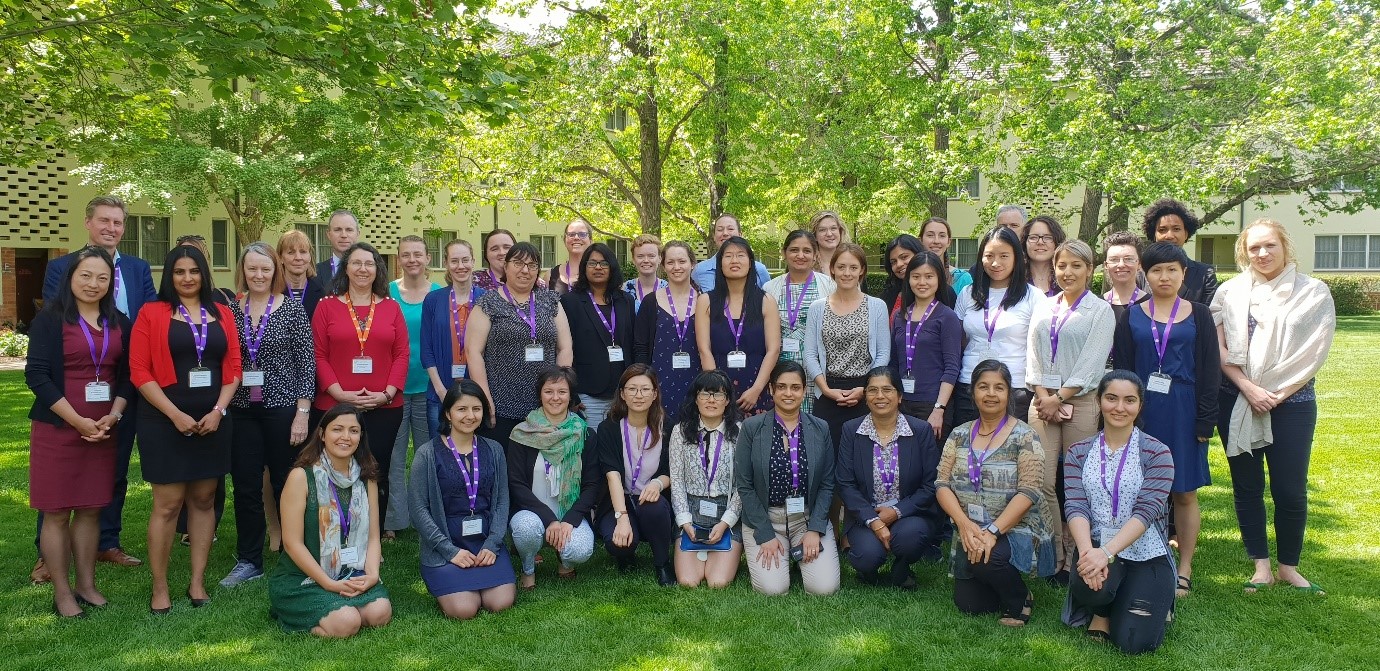
MAGIC workshop participants.
One of the EMCR events, the Mentoring and Guidance in Careers (MAGIC) workshop, welcomed 34 early-career female or gender diverse researchers in mathematics and physics based in Australia. The event allowed the participants to explore the many facets of forging a career in academic, government or industry settings, and how to build career success and resilience. The workshop was supported by funding from the Theo Murphy Initiative (Australia) through the Australian Academy of Science, the Payne-Scott initiative of the University of Sydney, the Australian National University and the ARC Centre of Excellence in Future Low-Energy Electronics Technologies.
New year celebrations, 2018. Photo: Matthew Noble
The Academy is governed by a Council of 17 Fellows, which met four times. To ensure Academy business was progressed effectively between Council meetings, the Executive Committee (EXCOM) met seven times. See all members of Council and EXCOM as at 31 December.
The Finance Committee met four times. It is one of seven governance committees of Council that have an advisory role.
2017–18 financial year
The Academy:
raised $18.9 million ($11.4 million government and grant funding, $3.6 million investment revenue, $3.9 million self-generated revenue)
invested $17.1 million, with major investments in $9.6 million grant-related expenditure, $5.43 million administration, $1.51 million project-related expenditure, $0.56 million Primary Connections.
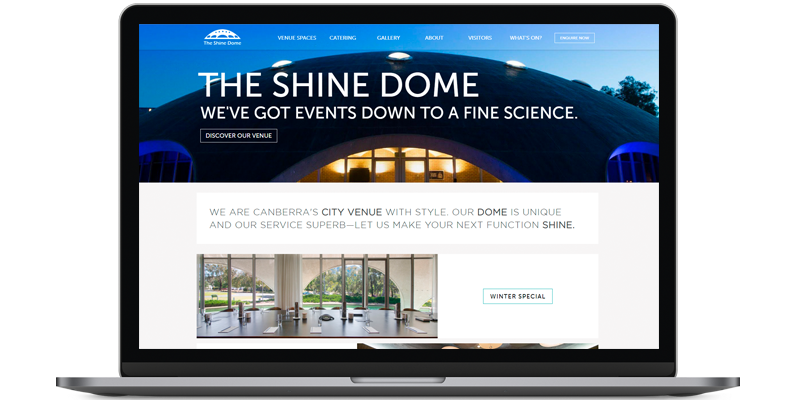
With a focus on external hire, the Shine Dome was hired on 106 days and earned a total of $223,000.
A new website to promote the Shine Dome as a venue provided an excellent opportunity to support marketing impact and revenue growth.
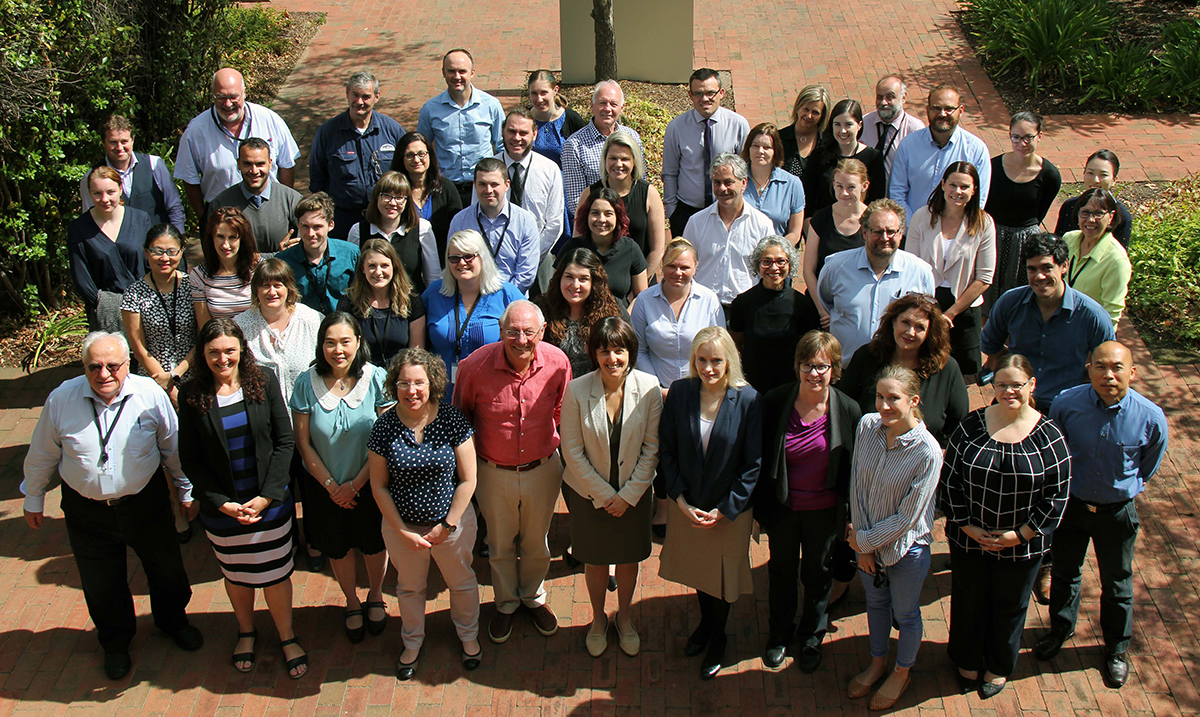
Academy Secretariat employees, 2018
employees at 31 December, of which 20 were part time
work teams implemented the Academy’s strategic objectives
years service by longest-serving current staff member
The Academy:
New year celebrations, 2018. Photo: Matthew Noble
© 2026 Australian Academy of Science